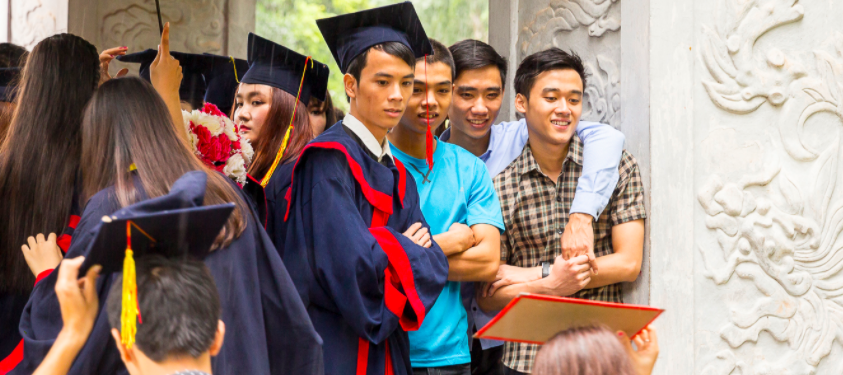High school recruiting events are taking place next month in Vietnam, and as the country returns to almost-normal, a panel of experts explained that education remains a priority to many parents and students in the country.
News and business analysis for Professionals in International Education
Have some pie!
Vietnam’s stature as source country remains strong
 Graduating students in Hanoi - 70% of the population are under 40 and education is held in high regard. Photo: Roger Harris
Graduating students in Hanoi - 70% of the population are under 40 and education is held in high regard. Photo: Roger Harris Some Vietnamese students may consider deferring, or even studying at home for their undergraduate degree as uncertainty swirls around admission dates for face-to-face teaching, but they would then be likely to consider overseas study at postgraduate-level, said Alex Green of Grok Global, a company helping institutions work in-country.
“For some institutions, TNE is an integral part of that recruitment strategy”
Speaking at a webinar organised by The PIE, he painted a picture of a vibrant marketplace, with some migration-led or prestige-led students intent on overseas study, while there was also an emerging market for TNE provision by foreign institutions.
“There are definitely different [market] segments,” he shared. “But also for some institutions, TNE is an integral part of that recruitment strategy in Vietnam.”
Green explained that if you look at the UK institutions that have done “particularly well or have a large market share… they are usually ones running programs in-country that allow students to transfer over to top up a degree or 2+2 or various models in between.”
Green said there was another category of student, often in Tier 2 cities, that would not consider overseas study because of budget restraint, but “they are concerned about the qualification”.
The number of Vietnamese studying abroad annually is around 130,000 said Green and growing at about 15% per year, with the US a market leader, followed by Australia, Canada, Japan and the UK.
Representing the University of Newcastle in Australia, Hung Truong, head of international student recruitment, reminded viewers that many students headed to Australia were focused on the migration possibilities offered beyond post-study work rights.
“For us, the students who come, they come for the full degree,” he shared, because two years in-country was needed to gain work rights.
“But having said that, what has changed versus 10 or even five years ago is in the past, you have students who will go overseas to do English and then the main program. Now they prefer to do English in Vietnam because that will save them a lot of money.”
But Truong also noted a trend towards some Vietnamese students opting to study abroad at a younger age, for high school.
“There are lots of students in Melbourne doing high school and then doing the whole degree here,” he said.
Academic merit-based scholarships were important for prestige, but Vietnam is predominantly a self-funded market that works via education agencies, panellists explained.
Truong said all institutions were fair and firm on commission payments to agencies so there was no major market volatility there, but that offering scholarships as an additional incentive was a common feature of the market with a growing middle class where “price is an issue”.
“There is a ‘race to the bottom'” that can be observed within this scope, he said – an issue previously covered on The PIE.
Ha Nguyen, who works for Ohio University in the US (via GrokGlobal) in Vietnam, explained that scholarships were one factor which had helped keep students fixed on their plans, however.
Some students had decided to study locally, thinking it would be safer in Vietnam, she acknowledged.
But “There are still a group of people who have contacted me about deferring to the spring semesters,” she said.
“They want to make sure that they will be able to keep the scholarship and go into the next semester,” she explained. “They are in waiting mode.”
Nguyen pointed out there were only six confirmed Covid-19 cases in Athens, Ohio, and the campus had made plans to open in the fall, although travel restrictions are the other significant factor.
“[Parents] are just waiting to see if the situation gets better”
According to her embassy source, priority will be given to F-1 [student] applications when the embassies resume visa processing, she said.
“I think ultimately [student decision] will really be dependent on the destination market, because, as you know, news for the US, UK, Australia, New Zealand, it changes differently,” she added.
“The sentiment I get from parents I’m working with, mostly, is that they still [their child] want to go; they’re just waiting to see if the situation gets better.”
- To attend our next PIE Webinar, focusing on education agencies and how they are working with educator partners during the Covid-19 crisis, click here.
Still looking? Find by category:


